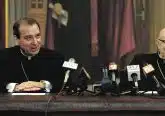The Catholic Moment: The bishop as steward
Thursday, March 4, 2010
By Father Kyle Schnippel
In a gathering, once upon a time, a Catholic priest was getting a good-natured ribbing from a friend. “You Catholics,” the friend quipped, “divide the world to conquer it.”
“It’s true,” the priest answered back. “We feel like we own the whole world!”
There is a measure of truth in this short back-and-forth among friends. As the church spreads to new territories and lands or grows in existing areas, these new territories are divided among dioceses, and a bishop is placed in charge to erect a new local church. In fact, the last Latin-Rite diocese to be erected in this country is the Diocese of Laredo, Texas, which was established in 2000, having been split from the Diocese of Corpus Christi.
A bishop does not erect the diocese of his own accord, but rather, as a direct commission from the Holy Father, for the bishop exercises his authority only in collegiality and partnership with the pope. As we have discussed in this column before, this is another example of the way in which the authority of Jesus, which He rightly claims as the Lord of the universe, is passed down to our very day through the laying-on of hands and apostolic succession.
In his mandate as a bishop, the leader of a local church has a responsibility to order all things not according to his own wishes, but in accord with the wishes and dictates of our God in heaven. As such, he is not just responsible for the souls of his Catholic parishioners, but for every soul that has residence within his diocese. As Uncle Ben reminds Peter Parker in the first Spider-Man film, “With great power comes great responsibility.” It is also a reminder as to why the pope and bishop are prayed for by name at every Mass.
Certainly the governance of a bishop is directly commissioned and guided by the dictates of our faith, for the bishop becomes the primary representative of Christ among the lay faithful in a certain diocese. It is the dictates of the faith which guide his establishment of parishes throughout his diocese, that the Gospel may not go unheard. The faith guides his teaching and preaching, how he interacts with his priests and parishioners and how he sees the world. And, his priests and faithful give assent and agreement to his leadership, for it is as if Christ were leading us.
However, there is another source of authority that the bishop rightly claims as his own: the dictates of natural law. Through our reasoned study of the universe, we are able to discern the fingerprints of God found written on the human soul, in the mysteries of creation and in the stirring of the spirit. It is here that the bishops find the universal aspect of their teaching authority. It in the dictates of natural law that the bishop is able to comment on the constructs of the world, for natural law applies universally.
But this governance, whether by mandate of the Gospel or dictate of reason, is not for its own sake. Rather, this governance is entrusted to the bishop, who shares it with his priests so that he may offer all things back to the Father in heaven. All that we are given is but a mere gift, a loan entrusted to us, and happy that man whom the master finds waiting and expectant upon his return, as Jesus instructs us in His parables.
The bishop governs so that he may sanctify. The goal of what we do here below is not merely social justice, it is not merely the education of children or the celebration of the sacraments, as important as each of these are. The goal is to make the Gospel known to all people, to go forth and preach, teach and sanctify, and by this to aid in the establishment of the kingdom of God in our world, in our day and age.













